Potassium
Potassium is a chemical element with the symbol K and atomic number 19. It is a soft, silvery-white metal that reacts violently with water and air. Potassium is an essential mineral that plays a key role in various bodily functions.
Properties of Potassium:
- Atomic number: 19
- Symbol: K
- Atomic mass: 39.10
- Physical state at room temperature: Solid
- Color: Silvery-white
- Boiling point: 1,413°C (2,575°F)
- Melting point: 337°C (639°F)
Uses of Potassium:
Potassium has several important uses, including:
- As a nutrient for plant growth in fertilizers
- In the production of soaps and detergents
- As a component in some types of glass and ceramics
- In various industrial processes
Health Benefits of Potassium:
Potassium is an essential mineral that has several important health benefits, including:
- Regulating fluid balance in the body
- Supporting muscle contractions and nerve signals
- Helping to maintain healthy blood pressure
- Reducing the risk of kidney stones and bone loss
Sources of Potassium:
Potassium is found in a wide variety of foods, including:
- Fruits such as bananas, oranges, and avocados
- Vegetables such as spinach, potatoes, and tomatoes
- Legumes such as lentils and beans
- Nuts and seeds
Study Guide:
To study potassium effectively, focus on the following key points:
- Understand the properties of potassium, including its atomic number, symbol, and physical state.
- Learn about the uses of potassium in various industries and its importance as a nutrient for plant growth.
- Explore the health benefits of potassium and its role in maintaining overall well-being.
- Identify sources of potassium in foods and understand the importance of including potassium-rich foods in a balanced diet.
By mastering these key points, you will develop a comprehensive understanding of potassium and its significance in both scientific and practical contexts.
.◂Science Worksheets and Study Guides Second Grade. Plants
Study Guide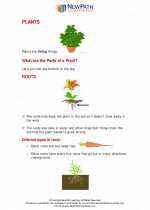 Plants
Plants  Activity Lesson
Activity Lesson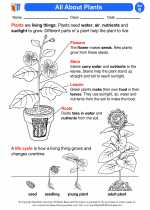 All About Plants
All About Plants  Activity Lesson
Activity Lesson All About Plants
All About Plants  Worksheet/Answer key
Worksheet/Answer key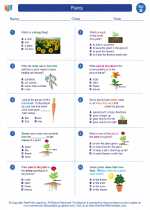 Plants
Plants  Worksheet/Answer key
Worksheet/Answer key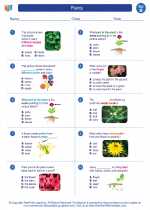 Plants
Plants  Worksheet/Answer key
Worksheet/Answer key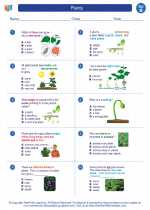 Plants
Plants  Worksheet/Answer key
Worksheet/Answer key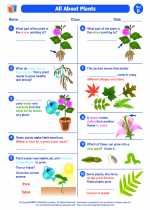 All About Plants
All About Plants  Vocabulary/Answer key
Vocabulary/Answer key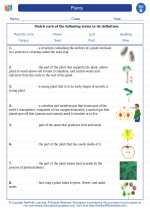 Plants
Plants  Vocabulary/Answer key
Vocabulary/Answer key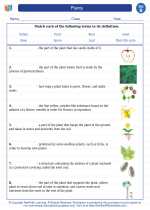 Plants
Plants 

 Activity Lesson
Activity Lesson
 Activity Lesson
Activity Lesson
 Worksheet/Answer key
Worksheet/Answer key
 Worksheet/Answer key
Worksheet/Answer key
 Worksheet/Answer key
Worksheet/Answer key
 Worksheet/Answer key
Worksheet/Answer key
 Vocabulary/Answer key
Vocabulary/Answer key
 Vocabulary/Answer key
Vocabulary/Answer key

The resources above cover the following skills:
Concepts of Life Science (SC1, SC2, SC3)
The student demonstrates an understanding of the structure, function, behavior, development, life cycles, and diversity of living organisms by observing and comparing external features of plants and of animals that may help them grow, survive, and reproduce.